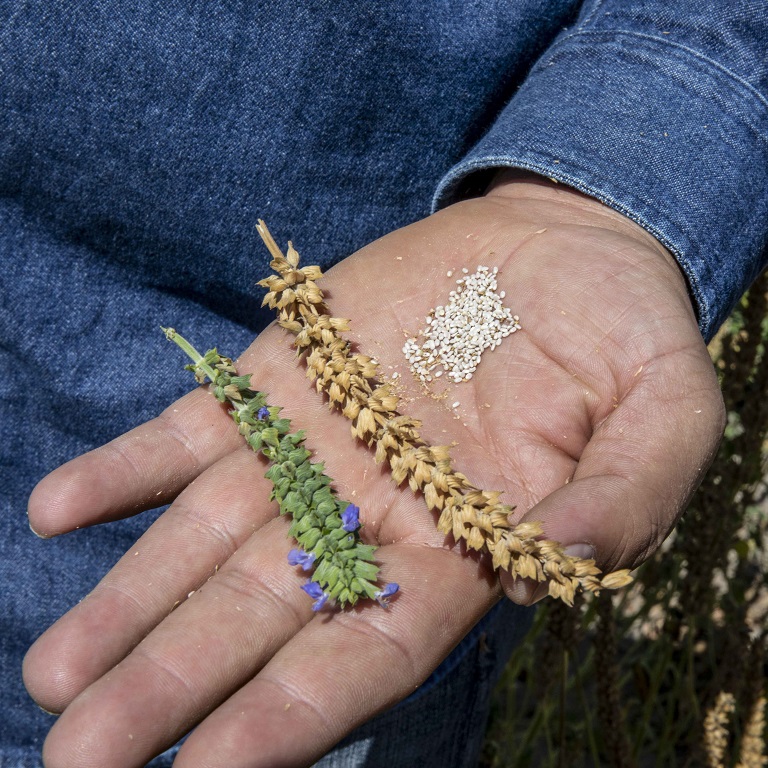Learn about the benefits of chia seeds for your skin, whether through the food you eat or the skin care products you use.

What are chia seeds?
Most people know chia seeds as a popular ingredient at their favorite smoothie shop or juice bar. That’s because these little seeds are packed with nutrients like fiber, protein, the good kind of fat, minerals, vitamins and antioxidants all in a low-calorie package.
But chia seeds can do more than nourish your body from the inside. They can also nourish your skin from the outside. One of nature’s most potent botanicals, these tiny little super seeds can also be key ingredients in skin care products. That’s why many Nutrilite™ supplements and Artistry™ beauty products include chia seeds. But what are chia seeds? Where do chia seeds come from?
Growing chia seeds: Where do chia seeds come from?
Chia seeds come from a plant in the mint family that blooms with blueish-purple flowers. They are native to Mexico and surrounding areas where people have been using them in some form for food, folk medicine or early cosmetics for more than 5,000 years. They were even offered up as gifts to gods in religious ceremonies.
Mexico is also one of the locations where the seeds used in Nutrilite and Artistry products are grown. In fact, the special variety of white chia seeds was developed by researchers at Nutrilite Rancho El Petacal, one of three certified organic Nutrilite farms.
Are all chia seeds the same?
Chia seeds can be black or white. When comparing black vs. white chia seeds, most seeds deliver essentially the same nutritional benefits regardless of color. Nutrilite researchers at El Petacal, however, have been researching chia seeds for years and discovered they are not all the same.
White chia seeds benefits
Regular chia is susceptible to diseases and fungus. Nutrilite researchers at El Petacal experimented with selective breeding to develop an optimized white chia variety.
The special white chia variety they developed is high in omega-3 and protein, resistant to pests and disease, and has larger seeds that produce up to double the yield.
The patented variety is named the Rehnborg White Chia Seed after Carl Rehnborg, founder of the Nutrilite brand.
Benefits of chia seeds for skin: From the inside
In addition to all the nutrition chia seeds provide when consumed, they also provide benefits for your skin. Omega-3 fatty acids are the building blocks of our cellular walls. The high content of omega-3 fatty acids in chia seeds works to support your skin health by supporting your skin’s structural health.
Benefits of chia seeds for skin: From the outside
Chia seeds also support your skin when used in topical skin care products, including to help nourish and condition the skin, improving barrier function and moisturization, and helping to balance the skin’s microbiome. That’s why Artistry scientists included different forms of white chia seeds in the Artistry Skin Nutrition™ line of products, including chia seed oil, extract and gel.
The white chia seed oil is used to support the skin’s moisture barrier, which is under constant attack from the environment.
“Whether you live in an arid climate or are plagued by the cold, your skin is likely constantly struggling to maintain moisture,” said Louise Schneider, an Artistry skin care senior principal research scientist. “That’s because environmental factors can damage your moisture barrier. White chia seed oil helps strengthen the skin’s barrier function and seal in moisture.”
White chia seed extract provides antioxidant support for your skin, and white chia seed gel supports a balanced skin microbiome and helps prevent biofilm formation. The skin’s microbiome is a layer of tiny organisms that naturally live in harmony and help keep skin looking healthy. When they become unbalanced, they can form biofilms which negatively impact skin’s overall health.
“The white chia seed gel has been shown to help prevent your skin’s microbiome from getting out of control,” Schneider said. “It stabilizes and strengthens and nurtures the skin’s microbiome and keeps it in balance by minimizing the formation of biofilms.”
Whether you add chia seeds to your yogurt bowls, smoothies or salads or reap their benefits in skin care products, these tiny little seeds should definitely become part of your daily routine.